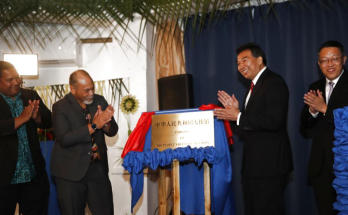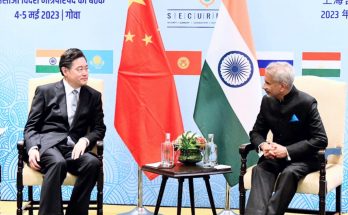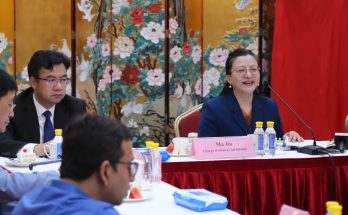NEW DELHI: India and Japan are set to deepen their strategic coordination to shape an inclusive regional architecture and to ensure freedom of navigation prevails against the backdrop of China’s assertiveness.
Laying out a concrete roadmap for enhancing their strategic partnership, the talks between Prime Minister Narendra Modi and his Japanese counterpart Shinzo Abe culminated in a an overarching vision for peace and stability in the region and beyond, which is reflected in the joint statement entitled, ‘India and Japan Vision 2025: Special Strategic and Global Partnership Working Together for Peace and Prosperity of the Indo-Pacific Region and the World.’
Raising concerns about the escalation in geopolitical tensions in the Indo-Pacific region, Mr Modi and Mr Abe underscored that closer cooperation between Japan and India is the key to achieving peace and stability in the region. Acknowledging the progress made in strengthening the East Asia Summit to enhance dialogue on political and security issues, India and Japan reaffirmed their commitment to continue to work with all partners, especially with ASEAN which is at the core of EAS, to make EAS the premier leaders-led forum to discuss regional peace and security.
“India and Japan will work together in East Asia Summit to promote an inclusive, balanced and open regional architecture and maritime security in the region,” Mr Modi said.
South China Sea dispute
South China Sea, which has been at the heart of the dispute in the Asia-Pacific region, figured in the talks between both the leaders. Japan, which is locked into a dispute with China over islands in East China Sea, has raised concerns about China’s growing assertion in the region. “We stand strongly for ensuring freedom of navigation and over-flight, and unimpeded maritime commerce. We believe that disputes must be resolved peacefully and that all countries must abide by international law and norms on maritime issues,” Mr Modi said. The trilateral alliances that India and Japan have been building with US and Australia, is seen as a counter to China by many analysts.
Japan expressed its support for India’s membership of the APEC. Thanking Mr Abe for the support, Mr Modi said: “India will also strive for “our rightful place in a reformed UN Security Council”.
Regional economic and security forums
As per the joint statement, the two sides stated that, “India and Japan will work to strengthen regional economic and security forums and coordinate their actions to tackle global challenges including the reform of the United Nations, climate change as well as terrorism.”
Japan also expressed its support for India’s membership to the export control regimes. “The two Prime Ministers affirmed their commitment to work together for India to become a full member in the four international export control regimes: Nuclear Suppliers Group, Missile Technology Control Regime, Wassenaar Arrangement and Australia Group, with the aim of strengthening the international non-proliferation efforts,” as per the joint statement.
North Korea
The situation in North Korea, which has been a major concern for countries in the Asia-Pacific, figured in discussions between the two leaders. The two leaders expressed concern over North Korea’s continued development of its nuclear weapons and ballistic missile programmes, including its uranium enrichment activities. “ They urged North Korea to fully comply with its international obligations, including under relevant United Nations Security Council resolutions and to take actions towards the denuclearisation of the Korean Peninsula. They also urged North Korea to address at the earliest the abductions issue,” according to the joint statement.
International Terrorism
Another significant development was the initiation of counter-terror cooperation between India and Japan. Against the backdrop of the rise of terror groups like Islamic State, the two sides voiced their zero tolerance for terrorism as they agreed to expand counter-terror cooperation through intelligence-sharing. For India, Japan’s expression of support against terrorist sanctuaries and its call to bring the perpetrators of the 26/11 Mumbai carnage is significant. Japan recently launched its counterterrorism unit to combat the growing threat of terrorism.
Author Profile
- India Writes Network (www.indiawrites.org) is an emerging think tank and a media-publishing company focused on international affairs & the India Story. Centre for Global India Insights is the research arm of India Writes Network. To subscribe to India and the World, write to editor@indiawrites.org. A venture of TGII Media Private Limited, a leading media, publishing and consultancy company, IWN has carved a niche for balanced and exhaustive reporting and analysis of international affairs. Eminent personalities, politicians, diplomats, authors, strategy gurus and news-makers have contributed to India Writes Network, as also “India and the World,” a magazine focused on global affairs.
Latest entries
 DiplomacyApril 23, 2024Resetting West Asia, re-booting the world, but not fast enough: T.S. Tirumurti
DiplomacyApril 23, 2024Resetting West Asia, re-booting the world, but not fast enough: T.S. Tirumurti India and the WorldApril 22, 2024India’s G20 Legacy: Mainstreaming Africa, Global South in global agenda
India and the WorldApril 22, 2024India’s G20 Legacy: Mainstreaming Africa, Global South in global agenda DiplomacyApril 10, 2024Diplomat-author Lakshmi Puri pitches for women power at LSR
DiplomacyApril 10, 2024Diplomat-author Lakshmi Puri pitches for women power at LSR India and the WorldApril 6, 2024UN envoy pitches to take India’s solutions to the world stage
India and the WorldApril 6, 2024UN envoy pitches to take India’s solutions to the world stage








